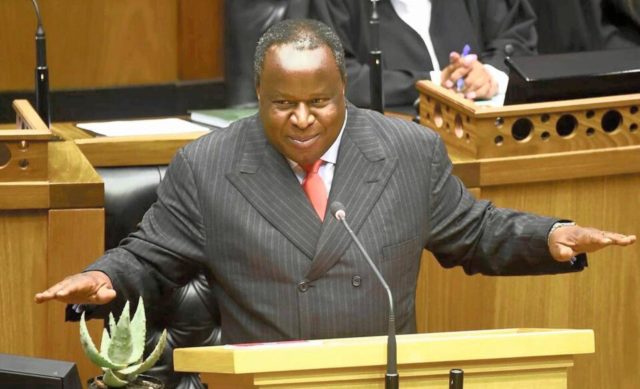OPINION: Finance Minister Tito Mboweni may be tempted to give morsels of handouts as local elections loom, but the national coffers are almost empty, writes Mushtak Parker.
OPINION: Mushtak Parker
WEDNESDAY’S National Budget Speech 2021 will probably be the most important presentation Tito Mboweni gives to Parliament since he became finance minister in 2018.
The enormity of his task cannot be overstated. Of the middle-income countries, the South African economy has been worst affected by the health and economic impact of the Covid-19 pandemic, exacerbated in January by a highly contagious new local variant of the virus, as the death-toll tragically inches towards the 50,000 mark.
South Africa even before the pandemic was in recession, reeling from the effects of a decade-long orgy of state capture and cronyism under the Zuma presidency.
Blaming everything on the legacy of apartheid, the Zuma kleptocracy and even on the pandemic, as is the propensity of ANC politicians, is a lame oversimplification of the challenges facing the country.
The sooner a healthy dose of pragmatism is injected into President Cyril Ramaphosa’s economic reforms the better for all South Africans. They are fed up with the harking back to liberation history, as important as it may be on special occasions. They want accountability on the ANC’s government history!
Apart from the first 13 years under President Nelson Mandela and Thabo Mbeki, when commendable gains were made on several fronts, the ANC’s record has been dismal, underpinned by ideological differences, party factionalism and entrenched corruption.
In his pandemic budget last year Mboweni rightly focused on a rescue package to mitigate the manifold impacts of the pathogen. He and his president gained many plaudits from international agencies for their decisive response to the outbreak of the virus.
Tomorrow’s economic recovery and reconstruction budget is an entirely different proposition. Transforming an economy from near dependency to a “new normalcy” in the midst of pandemic uncertainty, is fraught with political risks – for the president and the party. Remember Mbeki and Zuma were ousted after party in-fighting.
Mboweni may be tempted to give morsels of handouts as nationwide local elections loom in the autumn, but the national coffers are almost empty. Does he opt for a budget primarily aimed at kick starting the economy or as Lesetja Kganyago, governor of SARB, prefers, take a long view by introducing long-overdue structural reforms?
Perhaps he should heed the advice of IMF economist Ana Lucía Coronel. The two met in January at the Virtual IMF Staff Summit with Mboweni and his officials.
Coronel, the IMF lead on South Africa, warned that “the pandemic has further exposed vulnerabilities of the economy. Fiscal consolidation needs to be accompanied by a decisive reform package that removes constraints to growth and job creation.
“Tackling long-standing fiscal and structural challenges is more critical for a robust recovery and to pursue strong, durable, and inclusive growth. Creating conditions to boost private investment, redefining the role of the public sector in network industries to facilitate competition, and tightening fiscal policy to rein in rapidly increasing debt are imperative.”
Her priorities for Mboweni are to reduce the large fiscal deficits and debt levels through reining in the bloated public wage bill; to sort out the inefficient state owned entities (SOEs) especially Eskom; to remove constraints to GDP growth and job creation by simplifying employment protection legislation; accelerating governance reforms; facilitating private-sector participation in all sectors; and adopting measures to attract even more foreign direct investment (FDI).
She strongly recommends that any “transfers to SOEs be conditional on meeting ambitious but realistic performance targets; rationalise compensation; dismantle ill-targeted subsidies; and improve enforcement of tax compliance.
“Recurring power outages in the midst of a deep recession underscore the need for bold action to redefine Eskom’s business model so that it becomes self-sustaining.”
Failing fundamental reforms, she warned, Eskom’s problems will continue to weigh on public finances and constrain economic growth prospects.
In contrast, Team Ramaphosa’s rhetoric is dominated by a mixture of legacy, aspiration, denial and a near-surreal view of the state of the economy, more to do with a “can do, must do” attitude.
In his response to the debate on the State of the Nation Address (Sona) in Parliament , Ramaphosa was adamant about “progress, not promises. The economy is already showing signs of a strong recovery.
“We will rebuild our economy in a manner that is more inclusive, that creates jobs and that lifts people out of poverty. We will put an end to corruption, keep our streets safe and build a state that can effectively serve the people.”
Yet, in his Sona to Parliament in February, Ramaphosa said: “poverty is on the rise. Inequality is deepening. In the third quarter of 2020, our economy was 6% smaller than it was in the last quarter of 2019. There were 1.7 million fewer people employed in the third quarter of 2020 than there were in the first quarter, before the pandemic struck.”
The president confidently predicted: “As a result of the relief measures that we implemented and the phased reopening of the economy, we expect to see a strong recovery in employment.”
Unemployment is at a staggering 30.8%.
His focus instead is on four priorities – a massive roll-out of infrastructure buoyed by a R340 billion project pipeline in network industries such as energy, water, transport and telecoms; a massive increase in local production; an employment stimulus to create jobs and support livelihoods; and the rapid expansion of energy generation capacity.
Ramaphosa the botanist – there’s a thought! Unfortunately, his invoking in the Sona of the unique resilient Western Cape fynbos ecosystem thriving in all seasons as a metaphor for the beloved country, is as misplaced as his team’s perceptions of the state of the economy.
* Parker is an economist and writer based in London.








